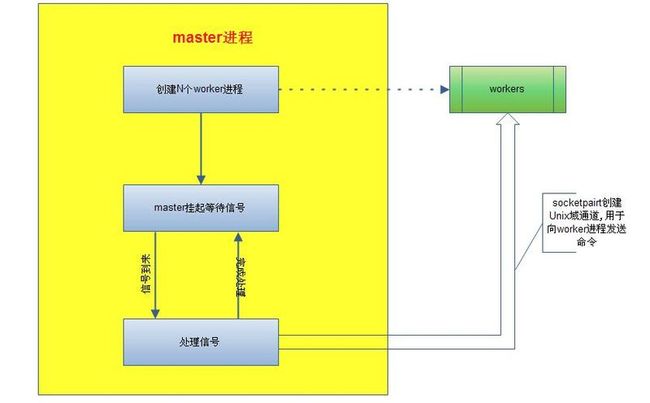erlang分布式入门(四)-TCP Server的详解与改进
在上一篇实现的erlang分布式入门(三)-TCP Server-Client 中的accept函数如下:
accept(LSocket) ->
{ok, Socket} = gen_tcp:accept(LSocket),
spawn(fun() -> loop(Socket) end),
accept(LSocket).
使用BIF的spawn方法,创建了一个新的进程loop来处理客户端连接,主要业务在loop函数中实现,然后继续accept新的客户端连接。
spawn的说明如下:
spawn(Fun) -> pid() Types: Fun = function() Returns the pid of a new process started by the application of Fun to the empty list []. Otherwise works like spawn/3. spawn(Node, Fun) -> pid() Types: Node = node() Fun = function() Returns the pid of a new process started by the application of Fun to the empty list [] on Node. If Node does not exist, a useless pid is returned. Otherwise works like spawn/3. spawn(Module, Function, Args) -> pid() Types: Module = Function = atom() Args = [term()] Returns the pid of a new process started by the application of Module:Function to Args. The new process created will be placed in the system scheduler queue and be run some time later. error_handler:undefined_function(Module, Function, Args) is evaluated by the new process if Module:Function/Arity does not exist (where Arity is the length of Args). The error handler can be redefined (see process_flag/2). If error_handler is undefined, or the user has redefined the default error_handler its replacement is undefined, a failure with the reason undef will occur. > spawn(speed, regulator, [high_speed, thin_cut]). <0.13.1> spawn(Node, Module, Function, Args) -> pid() Types: Node = node() Module = module() Function = atom() Args = [term()] Returns the pid of a new process started by the application of Module:Function to Args on Node. If Node does not exists, a useless pid is returned. Otherwise works like spawn/3.
但是由于gen_tcp:accept是阻塞的,所以我们在服务端启动tcp_server之后没有返回值,erlang的命令行一直阻塞在那里,一直等到有客户端连接上去才有反应。
以下是accept函数的说明:
accept(ListenSocket) -> {ok, Socket} | {error, Reason}
accept(ListenSocket, Timeout) -> {ok, Socket} | {error, Reason}
Types:
ListenSocket = socket()
Returned by listen/2.
Timeout = timeout()
Socket = socket()
Reason = closed | timeout | system_limit | inet:posix()
Accepts an incoming connection request on a listen socket. Socket must be a socket returned from listen/2. Timeout specifies a timeout value in ms, defaults to infinity.
Returns {ok, Socket} if a connection is established, or {error, closed} if ListenSocket is closed, or {error, timeout} if no connection is established within the specified time, or {error, system_limit} if all available ports in the Erlang emulator are in use. May also return a POSIX error value if something else goes wrong, see inet(3) for possible error values.
Packets can be sent to the returned socket Socket using send/2. Packets sent from the peer are delivered as messages:
{tcp, Socket, Data}
unless {active, false} was specified in the option list for the listen socket, in which case packets are retrieved by calling recv/2.
我们知道nginx的Master进程只用于接收客户端连接,然后把连接交给worker子进程去处理。这是高并发服务器处理大量连接的很有效的方式。
以下是改进版的TCP服务端:
echo_server.erl
-module(echo_server).
-export([start/2, loop/1]).
%% @spec start(Port::integer(), Max::integer())
%% @doc echo server
start(Port, Max) ->
generic_server:start(echo_server, Port, Max, {?MODULE, loop}).
%% @spec loop(Sock::port())
%% @doc echo_server
loop(Sock) ->
case gen_tcp:recv(Sock, 0) of
{ok, Data} ->
io:format("server recv data close~p~n",[Data]),
gen_tcp:send(Sock, Data),
loop(Sock);
{error, closed} ->
io:format("client sock close~n"),
gen_server:cast(echo_server, {connect_close, self()})
end.
generic_server.erl
%% a generic tcp server
-module(generic_server).
-author('cheng [email protected]').
-vsn('0.1').
-behaviour(gen_server).
-define(TCP_OPTIONS, [binary, {packet, raw}, {active, false}, {reuseaddr, true}]).
-record(server_state, {
port, % listen port
loop, % the logic fun
ip=any, % ip
lsocket=null, % listen socket
conn=0, % curent connect
maxconn % max connect
}).
%% internal export
-export([init/1, handle_call/3, handle_cast/2, handle_info/2, code_change/3, terminate/2]).
%% start tcp server
-export([start/4]).
-export([accept_loop/5]).
%% start the generic server
start(Name, Port, Max, Loop) ->
State = #server_state{port=Port, loop=Loop, maxconn=Max},
io:format("max connection is ~p~n", [Max]),
gen_server:start_link({local, Name}, ?MODULE, State, []).
%% create listen socket
init(State = #server_state{port=Port}) ->
case gen_tcp:listen(Port, ?TCP_OPTIONS) of
{ok, LSocket} ->
{ok, accept(State#server_state{lsocket=LSocket})};
{error, Reason} ->
{stop, {create_listen_socket, Reason}}
end.
%% accept spawn a new process
accept(State =#server_state{lsocket=LSocket, loop=Loop, conn=Conn, maxconn=Max}) ->
proc_lib:spawn(generic_server, accept_loop, [self(), LSocket, Loop, Conn, Max]),
State.
%% accept the new connection
accept_loop(Server, LSocket, {M, F}, Conn, Max) ->
{ok, Sock} = gen_tcp:accept(LSocket),
if
Conn + 1 > Max ->
io:format("reach the max connection~n"),
gen_tcp:close(Sock);
true ->
gen_server:cast(Server, {accept_new, self()}),
M:F(Sock)
end.
%% the server receive the notify that a connect has construct
handle_cast({accept_new, _Pid}, State=#server_state{conn=Cur}) ->
io:format("current connect:~p~n", [Cur+1]),
{noreply, accept(State#server_state{conn=Cur+1})};
%% someone connect has been close, so change the max connect
handle_cast({connect_close, _Pid}, State=#server_state{conn=Cur}) ->
io:format("current connect:~p~n", [Cur-1]),
{noreply, State#server_state{conn=Cur-1}}.
handle_call(_From, _Request, State) -> {noreply, State}.
handle_info(_Info, State) -> {noreply, State}.
code_change(_OldVsn, State, _Extra) -> {ok, State}.
terminate(_Reason, _State) -> ok.
主要使用了erlang的gen_server内置函数,详解:http://www.erlang.org/doc/design_principles/gen_server_concepts.html
